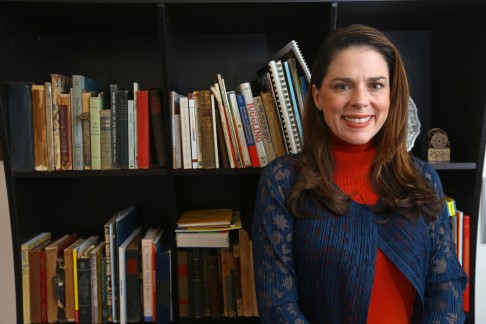
Hong Kong children get help from a centre that uses positive psychology
Workshops empower dispirited children to deal with the trials of life

Counsellors traditionally treat problems such as anxiety or depression as they arise. But instead of focusing on the condition, a positive psychology movement led by pioneers such as Dr Martin Seligman believe helping people change their habits of negative thinking can improve how they feel, too.
Justine Campbell is an avid advocate of this idea. That's why she set up Mindquest Group, an emotional well-being centre in Kennedy Town that adopts this approach to take youngsters and adults "from being just OK to living life to its fullest".
"People think when you're practising positive psychology, you are happy and carefree, and live without anger and frustration all the time. But … if you have negative emotions, it means you are alive and normal," Campbell says.
"Whole-person education is critical to equip individuals with the resources to be able to ride the inevitable waves of life. We do not know what the future holds for our children, but we can prepare them by empowering them with the necessary tools like resilience, self-efficacy, optimism, collaboration skills and mindfulness."
A former marketing executive, Campbell began exploring positive psychology to help her oldest son, then four years old, when he was struggling to fit into his new environment after the family relocated to Hong Kong in 2007.
For almost a year, she took monthly trips to Australia to train with a neuro-psychologist specialising in cognitive behavioural therapy (CBT).
Since the skills helped her son, Campbell decided they would benefit other children and adults, too. So she pursued a master's degree in counselling, became certified as neuro-linguistic programming practitioner, and set up her centre.
"I hope that through the work that I am doing in empowering parents, I can alleviate some of the struggles that I had at the time," says Campbell.

Rather than single out an individual or group, she believes everybody can benefit. Among her centre's most sought-after programmes is Mindquest Kids, a 12-week series of workshops organised in conjunction with the Jadis Blurton Family Development Centre for children aged eight to 10. The programme is based on the principles of CBT but also incorporates elements of positive psychology. And as much as children need coaching, parents do, too. That's why the programme includes debriefings and sessions for parents. This helps children realise that "this is a team effort and they have the support of their parents", Campbell says.
The Mindquest Kids workshops came in handy for an expatriate mother when her child experienced enormous meltdowns after the family moved to Hong Kong three years ago. Although a "gorgeous, bright child" in her eyes, her youngster lacked self-confidence.
"Social emotional skills come more naturally to some than others," the mother says. "As a parent, you do everything you can to help your children reach their potential. It was time to get some help."
Through a series of games and educational material, she saw her child "become more comfortable in her own skin, throw fewer tantrums, show increased empathy, navigate relationships with friends more easily, and take charge of her feelings, especially how to react if things don't go her way".
You can't be a real friend to somebody else until you are the best friend to yourself
The lesson on the importance of differentiating between "green light" (positive) from "red light" (negative) thoughts was particularly constructive. "My child recognised that her thinking differed from facts and learned not to let them overcome her," the mother says.
Perhaps the most evident change was that her daughter wasn't afraid to stand up to a bully. "Through a combination of working with Justine and growing up, she realised on her own that the way things were going wasn't healthy, she got the confidence to … make things better," the mother says.
Because of frequent work with teenage girls grappling with self-worth, body image and friendships, Campbell decided two years ago to introduce REALgirl, an empowerment programme developed by Anea Bogue, a California-based specialist on self-esteem for women.
The programme helps girls, aged nine to 15, to navigate the ups and downs of teen angst and societal expectations.
Over three months, participants explore, for example, gender values by rewriting classic fairy tales to create independent and courageous female characters; examine newspaper and magazine clippings and learn to be more critical of unrealistic media portrayals, and reflect on personal relationship standards through creating artworks.

"The key message is that friendship needs to start from within yourself," says Campbell. "You can't be a real friend to somebody else until you are the best friend to yourself. REALgirl aims to encourage girls to let themselves be human, which is less than perfect."
She hopes teenagers can learn to stop comparing themselves with others - something she wishes she learned when she was young.
"We always compare ourselves with others who are smarter, prettier and more accomplished. We don't compare ourselves with others who are less fortunate," she says. "Therefore, we come up feeling that we are not good enough."
Instead, what we should consider is our own path, Campbell says: where was I and where am I now? Have I moved forward?
It has made family life less stressful for one mother who signed up her two daughters, aged 11 and 14, for the REALgirl workshops. "I was trying to anticipate a lot of issues that will come up in their adolescence," the mother says.
She wanted her daughters to find the confidence to let them stand up for their own beliefs and values if things become difficult in their teenage years.
And the workshops, she figured, provided a neutral, non-threatening and anonymous setting where her girls could share their fears and triumphs with peers who were going through the same issues, under Campbell's guidance.
It took a lot of persuasion to get her daughters to attend the programme, the mother says. But their perceptions changed after the first session, and they have gained a sense of empowerment and some understanding of her responsibilites as a parent.
"The programme opens up their minds and helps them appreciate why their mum is doing things this way," Campbell says.
"They might not agree with all my messages, but they understand that my objective and ultimate goal is to help them on this path of growth."